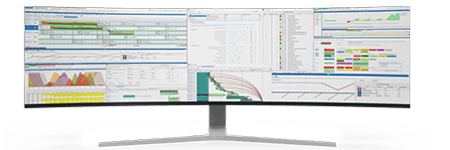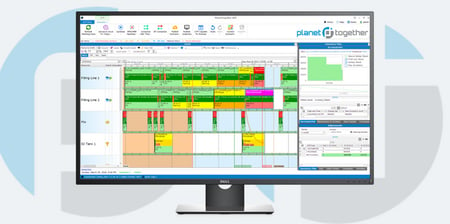
Balancing Cost Savings and Value Creation for Purchasing Managers
In the competitive food and beverage industry, purchasing managers find themselves at a crossroads between traditional cost-saving strategies and the increasing demand for value-driven procurement. This balancing act requires more than just buying ingredients and materials at the lowest price; it necessitates a strategic focus on creating long-term value through quality, innovation, and efficiency.
To support this evolving role, advanced planning and scheduling (APS) tools like PlanetTogether have emerged as valuable assets, particularly when integrated with enterprise systems like SAP, Oracle, Microsoft, Kinaxis, and Aveva. With this integration, purchasing managers can gain real-time insights and leverage data-driven strategies to find the optimal balance between cost savings and value creation.

Dynamics of Cost Savings vs. Value Creation
For years, cost-saving initiatives were the primary measure of success for purchasing managers. The challenge was straightforward: lower costs without compromising quality. However, as market demands evolve and supply chains grow increasingly complex, purchasing has become central to broader goals, including sustainability, innovation, and risk management.
Cost Savings: The immediate impact of purchasing cost reductions directly affects the bottom line. By negotiating better terms, seeking competitive bids, and leveraging volume discounts, purchasing managers can reduce direct costs, enabling companies to maximize profit margins in the short term.
Value Creation: Rather than focusing solely on price, value creation considers factors like supplier relationships, quality assurance, supply chain resilience, and sustainability. Value creation may lead to slightly higher upfront costs but can deliver long-term benefits, including reduced waste, improved supplier collaboration, and enhanced product innovation.
In essence, cost savings address the immediate needs of the company, while value creation ensures future competitiveness. The key is to strike a balance that aligns with both short-term financial goals and long-term strategic initiatives.


How Technology Enables Value-Driven Purchasing
To achieve both cost savings and value creation, food and beverage manufacturing facilities are increasingly turning to advanced tools and technologies. Platforms like PlanetTogether, when integrated with major ERP systems such as SAP, Oracle, Microsoft, Kinaxis, or Aveva, offer critical capabilities that enable purchasing managers to operate strategically.
PlanetTogether APS: A Catalyst for Strategic Procurement
PlanetTogether’s APS software provides a platform that goes beyond traditional procurement tools by integrating purchasing decisions with production planning, scheduling, and inventory management. It enables purchasing managers to align procurement with production demand, forecast accurately, and avoid over-purchasing or stockouts.

Integration with ERP Systems: Enhanced Data Flow and Real-Time Insights
When PlanetTogether is integrated with ERP systems such as SAP, Oracle, Microsoft, Kinaxis, or Aveva, it creates a seamless flow of information across departments. This integration allows purchasing managers to leverage data from all aspects of the business — from production schedules and demand forecasts to supplier performance and quality data — to make better-informed purchasing decisions.
The result? A strategic view of procurement that optimizes cost savings without sacrificing value. Here are some of the benefits purchasing managers in the food and beverage industry can achieve through such integration.

Benefits of Integration for Purchasing Managers: Cost Savings and Value Creation in Action
Data-Driven Demand Forecasting
With PlanetTogether integrated into ERP systems, purchasing managers gain access to accurate, real-time demand forecasts. This forecasting capability ensures that purchasing aligns closely with production needs, minimizing excess inventory and reducing the risk of stockouts.
For example, if a forecast in PlanetTogether predicts an uptick in demand for a particular ingredient, purchasing managers can act proactively to secure that ingredient at the best possible price. On the other hand, if demand is expected to decline, they can hold off on purchases to avoid overstocking, which leads to cost savings through reduced waste and storage costs.
Supplier Relationship Management
A value-driven procurement strategy emphasizes strong relationships with suppliers. Through integration with ERP systems, PlanetTogether enables purchasing managers to evaluate supplier performance across multiple metrics — not just cost. Metrics like on-time delivery, quality standards, and sustainability practices can be tracked, allowing purchasing managers to work closely with top-performing suppliers to secure quality products while driving long-term value.
For instance, a supplier with a slightly higher cost may offer exceptional quality and reliability, reducing the risk of product recalls or delays in production. Choosing to prioritize such suppliers contributes to value creation, leading to consistent product quality and consumer satisfaction.
Inventory Optimization
Inventory is often a significant contributor to costs in the food and beverage sector, given the perishability of ingredients. With the integration of PlanetTogether and an ERP system like SAP or Microsoft, purchasing managers can achieve just-in-time (JIT) inventory management, ensuring that materials are ordered and delivered as close to production time as possible.
By optimizing inventory in this way, purchasing managers can minimize holding costs, reduce spoilage, and ensure fresher ingredients in production. Cost savings are immediate, but the value created through optimized freshness and minimized waste can have long-term impacts on brand reputation and consumer loyalty.
Enhanced Agility in Response to Market Changes
The food and beverage industry is susceptible to rapid market shifts, whether due to seasonal trends, supply chain disruptions, or changing consumer preferences. Integration of PlanetTogether with ERP systems like Oracle or Kinaxis equips purchasing managers with the agility to respond swiftly to these changes.
For instance, if a supply chain disruption impacts the availability of a particular ingredient, purchasing managers can quickly adjust procurement plans, secure alternative suppliers, or modify production schedules. This adaptability minimizes the financial impact of disruptions and allows for quick adjustments to maintain product availability, balancing cost and value in real time.
Sustainability and Ethical Sourcing
Sustainability has become a cornerstone of value creation, especially in food and beverage manufacturing. Consumers are increasingly interested in the origins of their food and the ethical standards behind it. Integration between PlanetTogether and systems like Aveva or SAP enables purchasing managers to track sustainability metrics and manage ethical sourcing practices more effectively.
For instance, by choosing suppliers with sustainable practices, purchasing managers may incur a slightly higher cost initially. However, the long-term value gained from building a brand known for sustainability can lead to greater market appeal and loyalty among eco-conscious consumers. Additionally, this value-driven approach aligns with corporate sustainability goals, benefiting the organization beyond just financial metrics.

Practical Steps for Achieving Balance
To effectively balance cost savings with value creation, purchasing managers in food and beverage manufacturing should focus on several key strategies, leveraging the tools and integration capabilities available.
Define Clear Procurement Goals
Establish objectives that balance immediate cost reduction with long-term value, such as securing high-quality, sustainable ingredients or fostering reliable supplier relationships. Defining these goals helps guide decisions and ensures alignment with broader company values.
Leverage Data for Informed Decision-Making
With tools like PlanetTogether, purchasing managers should harness real-time data from ERP integrations to make informed purchasing decisions. Data on demand forecasts, supplier performance, and inventory needs can guide procurement strategies that meet both cost and value targets.
Prioritize Strategic Supplier Partnerships
Identify suppliers who align with the company’s goals for both cost savings and value creation. Consider working with them on exclusive agreements or long-term partnerships to secure favorable terms without compromising on quality or reliability.
Adopt a Total Cost of Ownership (TCO) Approach
Instead of focusing solely on purchase price, evaluate the total cost of ownership, including factors such as transportation, handling, quality impact, and potential wastage. This approach helps identify suppliers who provide the best overall value, even if their upfront costs are slightly higher.
Focus on Continuous Improvement
Purchasing managers should regularly assess procurement strategies and identify areas for improvement. Using metrics available through ERP integrations, they can track successes and adjust strategies as market conditions or organizational priorities evolve.
As the food and beverage industry continues to evolve, the role of purchasing managers is becoming increasingly strategic. Balancing cost savings and value creation is no longer an either-or decision but rather a dynamic interplay that requires a comprehensive approach and the right tools.
By integrating PlanetTogether with ERP systems like SAP, Oracle, Microsoft, Kinaxis, or Aveva, purchasing managers can gain unprecedented control and insight into procurement operations. This integration not only helps achieve cost savings but also creates value that supports long-term growth and competitive advantage. In a world where consumers and stakeholders alike demand high standards, this balanced approach to procurement is essential for success in the food and beverage industry.
Are you ready to take your manufacturing operations to the next level? Contact us today to learn more about how PlanetTogether can help you achieve your goals and drive success in your industry.